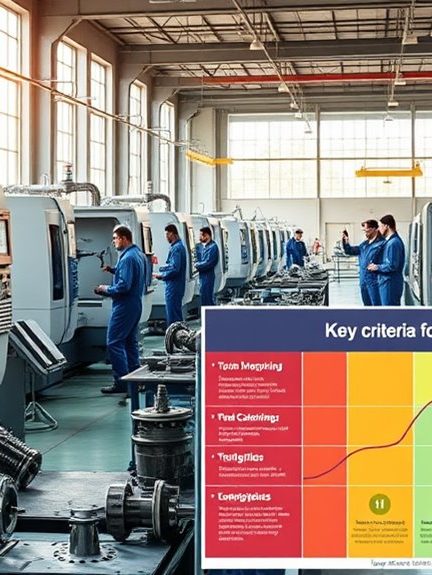Choosing the right machining manufacturer for custom projects involves careful evaluation of project requirements and manufacturer capabilities. It’s vital to assess the manufacturer’s experience, expertise, and the technology they utilize. Quality control processes must be reviewed to guarantee adherence to industry standards. Additionally, analyzing pricing structures and lead times can reveal hidden costs. Finally, checking customer references provides insights into reliability. Continuing with the evaluation can further illuminate significant factors influencing successful project outcomes.
Understanding Your Project Requirements
How can a clear understanding of project requirements enhance the selection of a machining manufacturer? A thorough grasp of project scope and material specifications is essential for optimizing the manufacturer selection process. Accurately defining project parameters guarantees alignment between the desired outcomes and the capabilities of potential manufacturers. For instance, understanding tolerances, surface finishes, and other technical specifications allows stakeholders to identify manufacturers with the requisite skill sets and equipment. Additionally, clarifying the project scope facilitates effective communication regarding timelines, costs, and production volumes. When organizations meticulously outline their requirements, they can make informed decisions, subsequently reducing the risk of costly errors or misalignments. As a result, precise documentation of project specifics is imperative for selecting a capable machining manufacturer.

Evaluating Manufacturer Experience and Expertise
Evaluating a machining manufacturer’s experience and expertise involves a thorough analysis of their industry specialization and the technology and equipment they utilize. Industry specialization indicates the manufacturer’s familiarity with specific materials and processes, which can greatly impact project outcomes. Concurrently, appraising the technology and equipment employed provides insight into their capability to meet precision and efficiency requirements.
Industry Specialization Assessment
When selecting a machining manufacturer, evaluating industry specialization is essential for determining their relevant experience and expertise. Manufacturers like Hogge Precision that focus on niche markets often possess specialized knowledge that can lead to superior outcomes in projects requiring specific applications. Assessment of their portfolio reveals if their experience aligns with the unique requirements of the intended sector, whether aerospace, automotive, or medical devices. In addition, verifying technical certifications is paramount, as these credentials provide insight into adherence to industry standards and quality assurance processes. The combination of niche market focus and verified certifications enables informed decision-making, ensuring that the selected manufacturer possesses both the proficiency and competence necessary to execute complex projects with precision and reliability.
Technology and Equipment Used
In evaluating a machining manufacturer, the technology and equipment they employ serve as critical indicators of their capability and efficiency. Cutting-edge machinery equipped with the latest machining innovations can dramatically enhance precision and reduce lead times, thus directly affecting project outcomes. Advanced CNC systems, robotic automation, and additive manufacturing technologies exemplify the equipment advancements that modern manufacturers should possess. A thorough assessment of a manufacturer’s technological infrastructure not only reveals their operational capacity but also highlights their commitment to quality and continuous improvement. Additionally, understanding their ability to integrate innovative processes can signal expertise in addressing complex project requirements. Consequently, manufacturers who leverage state-of-the-art technology effectively position themselves as proficient partners in delivering exceptional custom machining solutions.
Assessing Technology and Equipment Capabilities
Understanding the technology and equipment capabilities of a machining manufacturer is essential for ensuring that specific project requirements can be met efficiently and accurately. An assessment should start with a thorough evaluation of the manufacturer’s machinery, focusing on emerging technologies that enhance precision and production speed. Innovations such as multi-axis CNC machines and advanced robotic automation are vital indicators of a manufacturer’s competitive edge. In addition, it is important to scrutinize the integration of software solutions that facilitate real-time monitoring and data analytics, ensuring operational excellence. Manufacturers leveraging state-of-the-art equipment innovations can greatly improve process efficiency and product quality. Ultimately, determining a supplier’s technological prowess enables better alignment with project demands and long-term partnership viability.
Reviewing Quality Control Processes
A manufacturer’s commitment to quality control processes is a key determinant of its ability to deliver reliable and precision-engineered components. Rigorous quality metrics, including defect rates and process capability indices, serve to quantify performance and establish benchmarks. Adherence to established inspection standards, such as ISO 9001 or Six Sigma methodologies, underpins the manufacturer’s quality assurance framework, ensuring systematic evaluation of production processes. These standards guide manufacturers in implementing statistical process control techniques, enabling early detection of deviations and reinforcing consistency in output. Additionally, documented procedures for incoming material inspections, in-process assessments, and final evaluations further contribute to an integrated quality control system. A thorough review of these processes is essential for clients seeking a manufacturer capable of meeting stringent quality requirements.
Analyzing Pricing and Lead Times
In evaluating potential machining manufacturers, a thorough analysis of pricing structures is vital to guarantee competitive cost evaluation. Understanding production timelines is important, as lead times can substantially impact project schedules and overall operational efficiency. Additionally, evaluating any potential additional fees will provide an all-encompassing view of total project costs, allowing for informed decision-making.
Comparing Cost Structures
How can a manufacturer effectively compare cost structures when choosing a machining partner? A thorough cost comparison necessitates an analysis of various pricing strategies employed by potential suppliers. This involves evaluating not only the unit costs but also the overall value proposition, including additional services, quality assurances, and support provided. Manufacturers should request detailed pricing breakdowns that clarify labor, material, and overhead expenses, enabling an effective line-by-line analysis. In addition, contrasting fixed and variable pricing models can reveal hidden costs associated with fluctuations in production volume. By systematically evaluating these parameters, manufacturers can ascertain which machining partners offer the most favorable conditions for their specific projects while ensuring alignment with budgetary constraints and operational efficiencies.
Understanding Production Timelines
What factors contribute to production timelines in machining operations? Production variations greatly influence the efficiency of workflows, as different materials and complexity levels dictate the time required for operations. Lead time management becomes essential, encompassing the planning and scheduling of resources, equipment availability, and labor allocation. The choice of manufacturing techniques also plays an important role; for example, CNC machining may offer faster turnarounds compared to traditional methods. Additionally, the integration of advanced technologies such as automation can minimize delays and enhance predictability. Manufacturers must evaluate their capacity to meet demand fluctuations while ensuring quality, as any disruptions in processes lead to extended lead times. Ultimately, thorough understanding and management of these elements are critical for successful project execution.
Assessing Additional Fees
While evaluating additional fees in machining, several critical elements influence overall pricing alongside lead times. Manufacturers may impose various hidden charges that can considerably inflate the final project cost. These can include expedited shipping fees, tooling modifications, and material surcharges, all of which may not be apparent in initial quotes. To achieve a precise evaluation, clients should request a detailed breakdown of all potential costs upfront. Moreover, unexpected costs can arise from design changes or supply chain disruptions, thereby necessitating a thorough discussion with the manufacturer about their pricing policies and flexibility. Ultimately, a clear understanding of all financial aspects guarantees informed decision-making, fostering a more transparent relationship between clients and manufacturers.
Checking References and Customer Satisfaction
Evaluating references and gauging customer satisfaction are critical components in the selection process of a machining manufacturer. Organizations should systematically collect customer feedback, utilizing methods such as satisfaction surveys to quantify performance across various metrics. These surveys can disclose insights into the manufacturer’s reliability, quality consistency, and responsiveness. In addition, direct communication with previous clients can provide qualitative data, enhancing understanding of the manufacturer’s operational processes and potential challenges. Conversely, poor feedback trends may signal areas of risk that could adversely impact project outcomes. An in-depth analysis of references not only highlights the manufacturer’s strengths but also reveals potential limitations, forming an essential part of informed decision-making. Thorough diligence in this area promotes strategic alignment with customer project objectives.
Frequently Asked Questions
What Types of Materials Can Machining Manufacturers Work With?
Machining manufacturers typically work with materials such as aluminum and various plastics. Aluminum machining offers strength and lightweight properties, while plastic machining caters to diverse applications, providing versatility for custom projects requiring precision and durability in production.
How Can I Ensure My Intellectual Property Is Protected?
To guarantee intellectual property protection, one must implement NDA agreements and secure patent protections. These legal measures establish confidentiality and exclusive rights, safeguarding proprietary information against unauthorized use throughout the manufacturing and development processes.
What Are Common Machining Tolerances for Custom Projects?
Common machining tolerances typically range from ±0.005 inches to ±0.0001 inches, depending on application needs. Adhering to established tolerance standards is critical, and precision measurement guarantees compliance to achieve desired functional and dimensional specifications.
How Do Manufacturers Handle Project Delays or Issues?
Manufacturers address project delays or issues through robust communication strategies, ensuring all stakeholders are informed. They frequently implement effective solutions that align with project requirements, demonstrating adaptability and commitment to maintaining production timelines and quality standards.
Can I Request Prototypes Before Final Production?
Swiss machining manufacturers often accommodate prototype requests, providing production samples for evaluation. This process guarantees that specifications align with client expectations, facilitating adjustments before final production. Such practices enhance quality control and optimize overall project outcomes.

